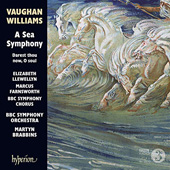
ESSENTIAL RECORDINGS

For a First Symphony, A Sea Symphony by Ralph Vaughan Williams (1872-1958) is unquestionably a bold and confident symphonic work. Written for soloists, chorus and orchestra, it justifiably merits immediate and commensurate comparison to Gustav Mahler's Symphony No. 8, also scored for soloists, chorus and orchestra. Oddly enough, these two works were practically premièred at the same time. The Mahler on 12 September 1910 in Munich, and the Vaughan Williams on 12 October 1910 at the Leeds Festival, while each one was unbeknownst to the other. Despite being focused on the text and vocal scoring, this work's orchestration is also quite stupendous. During the opening seconds and as soon as the powerful choir as intoned "Behold, the sea itself" the orchestration feels like a vast and deep ocean rolling under your feet. Based on texts selected from the anthology "Leaves of Grass" by Walt Whitman about the sea, ships and exploration, which I believe are a symbolic metaphor upon life, beliefs, existence, and the afterlife, it certainly offered Vaughan Williams plenty of rich fodder on which to build and proliferate. Near the end at: "Away O soul! hoist instantly the anchor! Sail forth and steer for the deep waters only", the uplifting impact is tangible, and after the final phrase: "O farther, farther, farther sail!" the sense of drifting away into the unknown is gripping.
This new Hyperion recording palpably renders each and every aspect and intent of this work with expressive force. Soprano Elizabeth Llewellyn and baritone Marcus Farnsworth sing as if inspired and propeled by the music's underlying current (pun intended), and I've rarely heard a choir of this magnitude sing with this much conviction. And who can blame them when the words by Walt Whitman are so pregnant with meaning. Conductor Martyn Brabbins brings all of these elements together and whips eveything into a frenzy when called upon, or man's the helm to steer the orchestra unto smoother waters when required (again, pun intended). Whichever spirit permeates the different segments of this work, it's always clearly made apparent. The audio engineering fully captures the forces involved with plenty of headroom to spare. Crank it up and enjoy the full glory of the opening segment - it will induce goosebumps and put a big smile on your face. Guaranteed!
Jean-Yves Duperron - September 2018